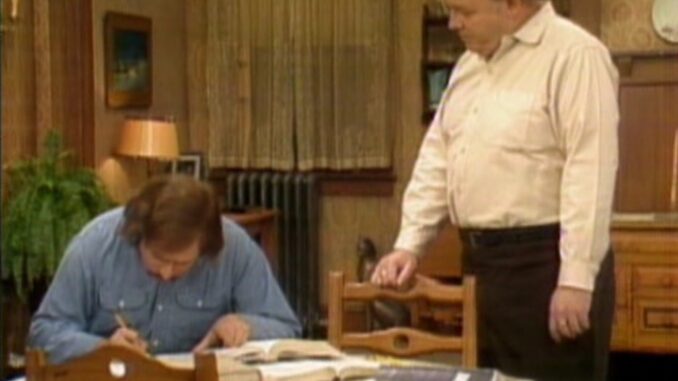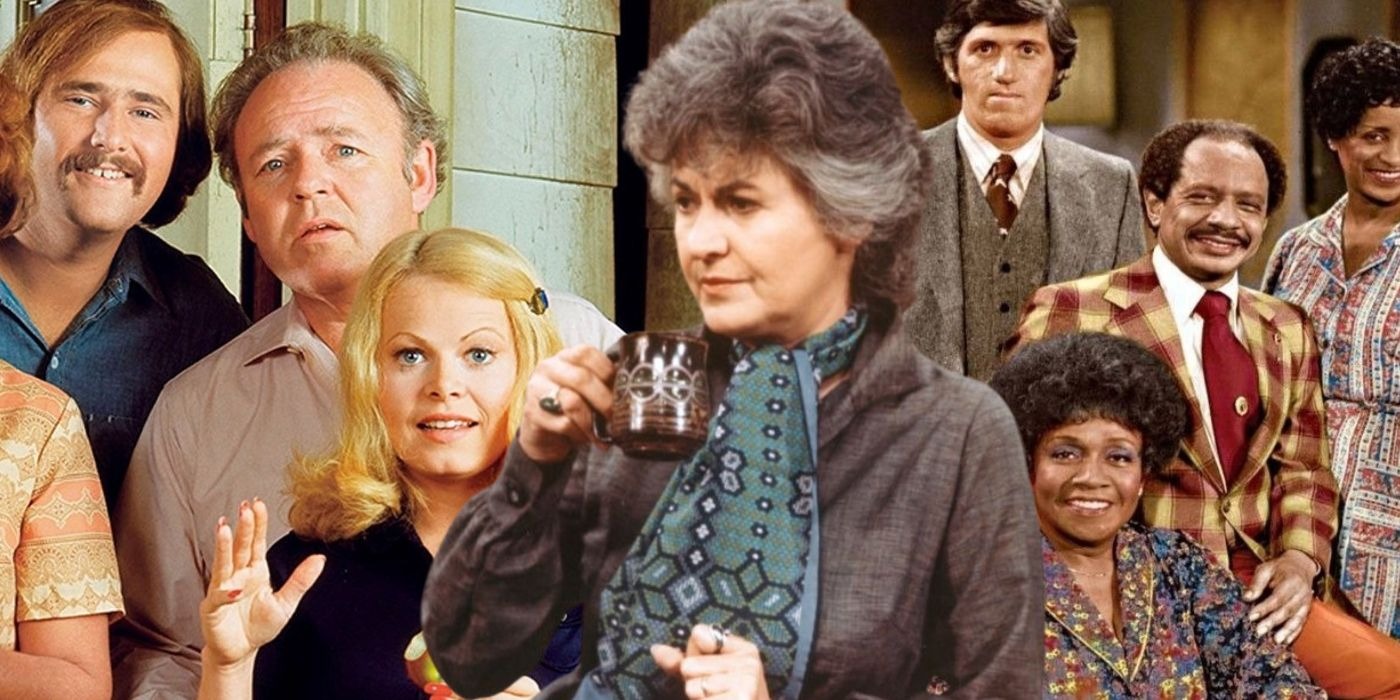
 All in the Family, American television situation comedy that aired on CBS for eight seasons (1971–79). The show continued from 1979 to 1983 under the title Archie Bunker’s Place. All in the Family became one of the most successful sitcoms of its time. The show was based on the popular British comedy Till Death Us Do Part (1965–75) and was adapted for an American audience by producers Norman Lear and Alan (“Bud”) Yorkin. Breaking new ground with its often controversial subject matter, All in the Family became the top-rated show in the United States for five consecutive years and won four Emmy Awards in a row for outstanding comedy series. Much of its success came from its frank and satirical treatment of sensitive or important topics, such as race, gender, sex, bigotry, and social inequity. The willing and deft portrayal of these topics made a dramatic impact at the time and a lasting influence on television.
All in the Family, American television situation comedy that aired on CBS for eight seasons (1971–79). The show continued from 1979 to 1983 under the title Archie Bunker’s Place. All in the Family became one of the most successful sitcoms of its time. The show was based on the popular British comedy Till Death Us Do Part (1965–75) and was adapted for an American audience by producers Norman Lear and Alan (“Bud”) Yorkin. Breaking new ground with its often controversial subject matter, All in the Family became the top-rated show in the United States for five consecutive years and won four Emmy Awards in a row for outstanding comedy series. Much of its success came from its frank and satirical treatment of sensitive or important topics, such as race, gender, sex, bigotry, and social inequity. The willing and deft portrayal of these topics made a dramatic impact at the time and a lasting influence on television.
The show concerns the domestic life of the Bunkers, a lower-middle-class white family living in Queens, New York. The protagonist and source for much of the humour was Archie Bunker (played by Carroll O’Connor), a vocal and prejudiced blue-collar worker. Archie, an ever-grouchy social conservative, holds a nostalgic view of America and sees his way of life threatened by the rise of ethnic minorities, such as African Americans, Hispanics, and Jews (all of whom he refers to using derogatory epithets). Archie’s harangues are tolerated by his neurotic and passive wife, Edith (Jean Stapleton), but are constantly challenged by his live-in son-in-law, Mike Stivic (Rob Reiner, later the director of such motion pictures as A Few Good Men [1992]), a college student and liberal married to Gloria (Sally Struthers). While Mike’s sympathies are the opposite of Archie’s, they are equally vocal and antagonistic.
Do you ever wonder why All in the Family gets mentioned whenever the greatest TV shows are discussed? There’s a reason this classic sitcom from the 1970s still holds a special place in millions of hearts. It wasn’t just another family comedy—it was a brave, raw, and brutally honest reflection of American life. In a time when most shows avoided controversy, All in the Family dove headfirst into the messiness of real issues like race, politics, gender, and class. Let’s take a nostalgic (and slightly jaw-dropping) stroll down memory lane.
The Birth of a Legend: How ‘All in the Family’ Came to Be
Inspired by a British Classic
Did you know that All in the Family was actually based on the British sitcom Till Death Us Do Part? Creator Norman Lear took the UK concept and gave it an American twist—one that resonated deeply with U.S. audiences.
Casting the Unforgettable Archie Bunker
No one could have predicted that a grumpy, loudmouth bigot like Archie Bunker would become America’s most beloved TV character. But Carroll O’Connor made him impossible to hate—even when you wanted to throw something at the screen.
Breaking the Mold: What Made ‘All in the Family’ So Different?
1. Tackling Taboo Topics on Prime-Time TV
Before All in the Family, sitcoms rarely touched real-life issues. This show smashed that barrier with storylines on racism, feminism, homosexuality, war, and more. Shocking? Yes. Necessary? Absolutely.
2. Archie vs. Michael: The Battle of Generations
Archie’s conservative rants clashed perfectly with son-in-law Michael’s liberal ideals. It was the perfect TV metaphor for America’s generational and ideological divide.
3. A Set That Felt Like Home
The worn living room set was simple but powerful. Viewers felt like they were sitting right there with Archie and Edith as life unfolded—awkward silences, angry shouts, and all.
Meet the Bunkers: The Most Memorable TV Family Ever
Archie Bunker: The Lovable Bigot
Archie could offend anyone with a single sentence—but somehow you still cared about him. Why? Because beneath the bluster was a scared, aging man terrified of a changing world.
Edith Bunker: The Heart of the Home
Jean Stapleton made Edith more than just “the dingbat.” She was kind, patient, and surprisingly wise—especially when Archie needed it most.
Gloria: The Voice of a New Generation
Gloria wasn’t afraid to challenge her father’s outdated ideas. She symbolized young women stepping into independence during the 1970s.
Michael “Meathead” Stivic: The Perfect Counterweight
Archie’s foil in every way, Michael (played by Rob Reiner) was the liberal hippie who made sure Archie never had the last word.
Cultural Impact: How ‘All in the Family’ Changed America
1. Starting National Conversations
Racism. War. Women’s rights. All in the Family forced living room debates across the country. People couldn’t ignore these issues anymore.
2. A New Kind of Sitcom
Before this show, sitcoms were pure escapism. Afterward? TV dared to be real.
3. Winning Big at the Awards
The show scooped up Emmys, Golden Globes, and even a Peabody Award for breaking new ground. Critics and fans couldn’t get enough.
Controversies That Shocked Viewers (And Made the Show Iconic)
1. The Language Barrier
Archie used racial and ethnic slurs—a huge risk for TV. But this was the point: to expose ignorance, not promote it.
2. The Abortion Episode
The episode about Gloria’s possible abortion made headlines—and history. No sitcom had ever gone there before.
3. Homosexuality on Prime Time
A brave episode revealed that Archie’s macho friend was gay—a stunning twist for 1970s television.
Spin-Off Success: The ‘All in the Family’ Universe
1. ‘The Jeffersons’: Moving on Up
America loved George and Weezy so much they got their own hit show—one that tackled race and wealth head-on.
2. ‘Maude’: Feminism Hits the Small Screen
Bea Arthur’s Maude became a feminist icon, showing TV viewers that strong, outspoken women could lead their own show.
3. ‘Archie Bunker’s Place’: A New Chapter
Even after Edith left, Archie carried on in his own spin-off, proving that the Bunker saga wasn’t over yet.
The Lasting Legacy of ‘All in the Family’
1. The Blueprint for Modern Sitcoms
Without All in the Family, there’d be no Roseanne, no The Office, no Modern Family. It rewrote the rules of what TV could do.
2. A Time Capsule of America
Watching the show now is like opening a window into 1970s life—flawed, funny, and fiercely real.
3. Still Relevant Today
The debates Archie and Michael had? They’re still happening today. Race, gender, politics—they never go out of style.
Fascinating Facts You Probably Didn’t Know
1. The Theme Song Was Almost Cut
“Those Were the Days” nearly didn’t make it to air. Imagine All in the Family without Edith’s warbling voice!
2. CBS Was Terrified
Network execs thought the show was too risky. Turns out, audiences were ready for something real.
3. Real Tensions on Set
Carroll O’Connor and Rob Reiner argued off-screen, too—just like Archie and Michael. Talk about method acting!
Why ‘All in the Family’ Will Never Be Duplicated
1. The Perfect Storm of Cast and Timing
Right actors. Right moment. Right mood in America. Lightning in a bottle that can’t be recreated.
2. No Fear of Offending
Today’s TV often plays it safe. All in the Family never did. And that’s why it stands alone.
Conclusion: The Show That Made Us Laugh, Cry, and Think
All in the Family wasn’t just a sitcom. It was a mirror—showing America its faults, its fights, and its funny bone. It made people uncomfortable in the best way. Decades later, we still quote Archie, smile at Edith, and shake our heads at Meathead. No wonder it’s etched in television history. If you’ve never watched it—or haven’t in years—maybe it’s time to visit the Bunkers again. You might see a little of your own family there, too.
